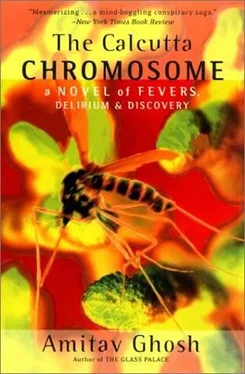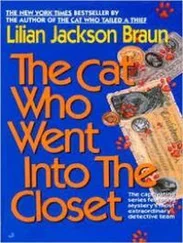'Why?' Phulboni demanded. 'Have there been others who…?'
'The year I first began this job,' the guard said, 'in '94, there was another who was not so fortunate: he died there – in just that way, lying on the rails, at dawn. The corpse was so mangled that they never discovered exactly who it was, but it was rumoured that he was a foreigner.'
He gave Phulboni a melancholy smile. 'No one ever goes near that station at night,' he said.
'Why didn't you tell me this before?' said Phulboni.
'I tried to,' said the guard, with a crooked smile. 'But you would not have believed me. You would have laughed and said, "These villagers, their heads are full of fantasies and superstitions." Everyone knows that for city men like you such warnings always have the opposite effect.'
Acknowledging the truth of this Phulboni apologized and asked the guard to sit and recount everything he knew.
For many years, the guard said, the signal-room had been home to a young lad called Laakhan. The boy had drifted in from somewhere up the line soon after the station was first built. He was a stray, orphaned by famine, with a thin, wasted body and a deformed hand. The signal-room was empty then, because no railway employee would agree to live in such a lonely, isolated place. So Laakhan made it his home. The guards and stokers who passed through taught him how to use a signal lamp and work the switches. He made himself useful to the railways and they let him stay.
The boy was in his teens when a stationmaster was finally found for Renupur. As it turned out this stationmaster was an orthodox, upper-caste man: he took an instant dislike to the lad, looking on him as an affront to himself. He told the villagers that Laakhan was worse than untouchable; that he carried contagion; that he was probably the child of a prostitute; that his misshapen left hand was a mark of hereditary disease. He tried his best to drive the boy away from the station, but Laakhan had nowhere to go. The boy built a bamboo shack on the tracks of the unused siding and tried to keep out of sight.
This drove the stationmaster into an even greater fury. On a moonless Amavasya night, during a storm, the stationmaster tried to kill the boy by switching the points and leading him before a train. But no one knew the station better than Laakhan and he managed to escape. Instead it was the stationmaster who tripped on a rail and fell before the train.
That was the last time that Renupur had a stationmaster.
Phulboni's mind was full of questions: having escaped a similar death he was consumed with curiosity about the boy's fate. 'Tell me more,' he begged the guard. 'What became of Laakhan? I must know; you must tell me.'
'There is not much else to tell,' the guard said. 'What people say is that he hid himself on a train and went to Calcutta. They say he was living at Sealdah Station when a woman found him and gave him a home.'
'Is that all?' Phulboni persisted. 'Who was the woman? What happened to Laakhan?'
The guard pulled an apologetic face. 'That's all I know,' he said. 'Except…'
'Except what?'
'The man who was my predecessor at this job once told me something. He said that he had talked to the foreigner – the one who died at Renupur. He, the foreigner, had come up to him on the platform, just as he was about to flag the train out. He said that he had been travelling with a young man, a native of Renupur. As a sahib, naturally, the foreigner was in first class while this other man was in third. But now he could not find the young man: he had disappeared. My predecessor could not help him; he hadn't noticed anyone else getting off at Renupur. The foreigner was very annoyed and said he would wait at the station. The guard, my predecessor, told him that whatever happened he should not stay the night at the station. He did everything he could to make him leave, but the sahib only laughed, and said, "Oh, you villagers… '"
'OH MY GOD!' Urmila cried suddenly, tugging at the booth's plastic curtain. 'What?' said Murugan.
'Sonali-di,' Urmila replied. 'I have to find a telephone.' She darted across the restaurant to the manager's desk at the back and picked up the telephone. Murugan waited to pay the bill and then followed her over.
She was staring at the receiver in shock when he caught up with her.
'Sonali-di's disappeared,' she said. 'She's not in her office, and she's not at home. She missed a staff meeting this morning and they've been trying to contact her. She hasn't been seen since last night. No one's answering the phone at her flat. Apparently I was the last person to talk to her.'
'What time was that?'
'About ten thirty, I think,' Urmila said. 'We went to her flat together, and I left about then.'
'I've got news for you, Calcutta,' Murugan said. 'I saw her after you did.'
'What?' Urmila cried. 'But you don't even know her.'
'But I still saw her,' said Murugan. 'I went out to my balcony at about one o'clock last night, and I saw her getting out of a taxi: she went into number three Robinson Street… '
With a wail of despair Urmila pushed him aside: 'Why didn't you tell me?' She ran to the road and flagged down a taxi. 'Come on,' she called out to him, over her shoulder. 'We have to hurry.' Murugan climbed in after her and slammed the door shut.
'Robinson Street,' Urmila said to the taxi driver. 'Between Loudon and Rawdon.'
Then she turned to Murugan. 'We have to find Sonali-di,' she said. 'We have to try and warn her.'
'Why her?' said Murugan.
'Don't you see?' Urmila said. 'Because she's in it too: she told me that story.'
The evening rush hour was just beginning and traffic was very heavy once the taxi got to Chowringhee. Urmila sat hunched over the front seat, urging the driver on.
When Murugan spoke to Urmila again it was in a voice that was unaccustomedly quiet. 'Listen, Calcutta,' he said. 'You've been on the move since this morning; maybe you should give yourself a timeout here, just to think things over.'
'Think what over?' said Urmila distractedly. They were on Theatre Road now, beside the Kenilworth Hotel, and the air was fragrant with the smell of kababs.
'About whether you want to get any deeper into this,' said Murugan.
'What else could I do?' she said, in surprise.
'We could stop the taxi right here,' said Murugan. 'And you could get out and go home; go back to whatever you were doing.'
A shadow fell over Urmila's face.
'Go back home?' Urmila said to herself, under her breath, resting her eyes on the neat, bright buildings of the British Council. If she went home she would have to buy fish on the way. Her mother wouldn't believe her if she said Romen Haldar wasn't really going to come to their house in the evening, to offer her brother a First Division contract. She could hear her already; 'Oh, you don't care about us at all: your family means nothing to you; all you care about is yourself and your career; that's why no one will marry you; that's what Mrs Gangopadhyaya said the other day… '
Urmila turned to Murugan with an emphatic shake of her head. 'No,' she said. 'I don't want to go home.'
'It's your life, Calcutta,' Murugan said philosophically. 'You know best.'
A build-up of traffic at the Loudon Road crossing brought the taxi rattling to a halt. Urmila turned away from the Pierre Cardin boutique at the corner. Her eyes were brimming with curiosity as they settled on Murugan.
'What about you?' she said to Murugan. 'Why are you going on with this? What's kept you at it so long?'
'Can't you tell?' Murugan said.
Urmila shook her head: 'No.'
Murugan gave her a grim smile. 'It's not me,' he said. 'It's what's inside me.'
'Do you mean malaria?'
'That too,' said Murugan.
Читать дальше












